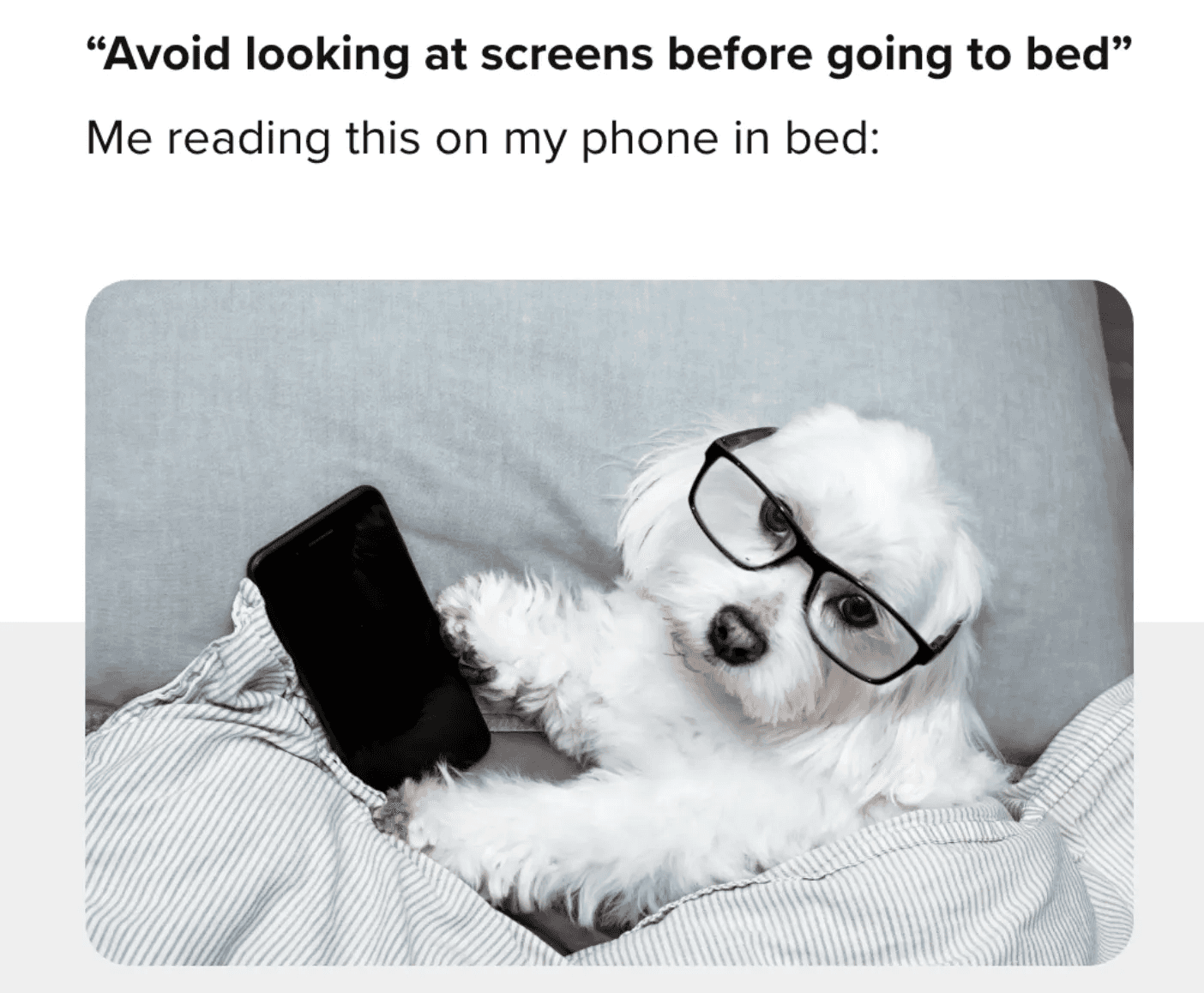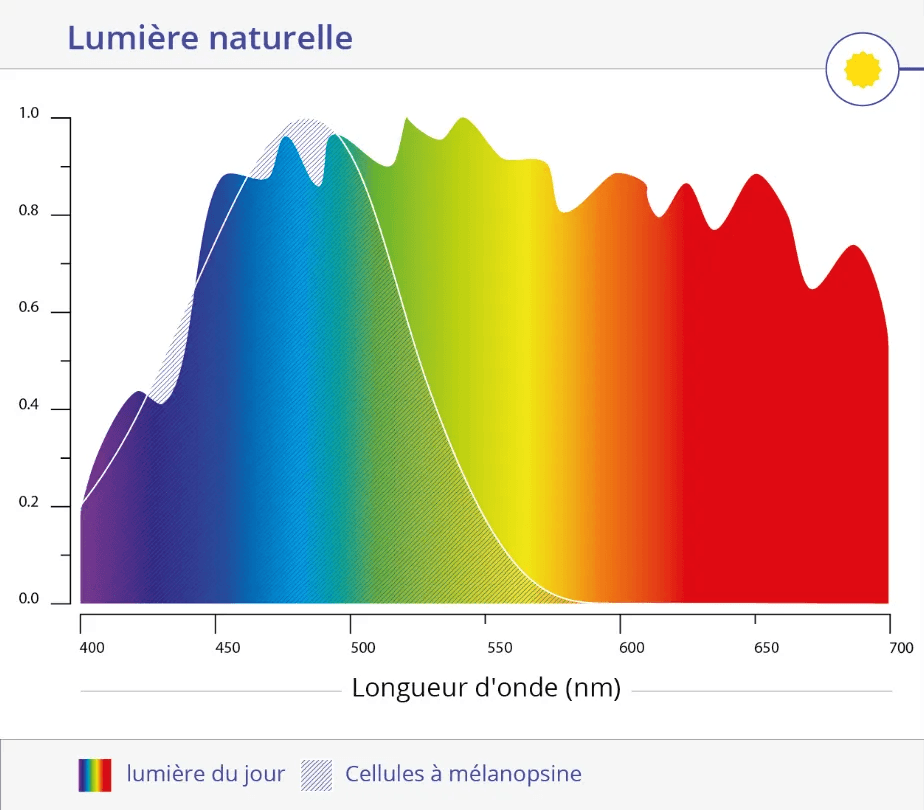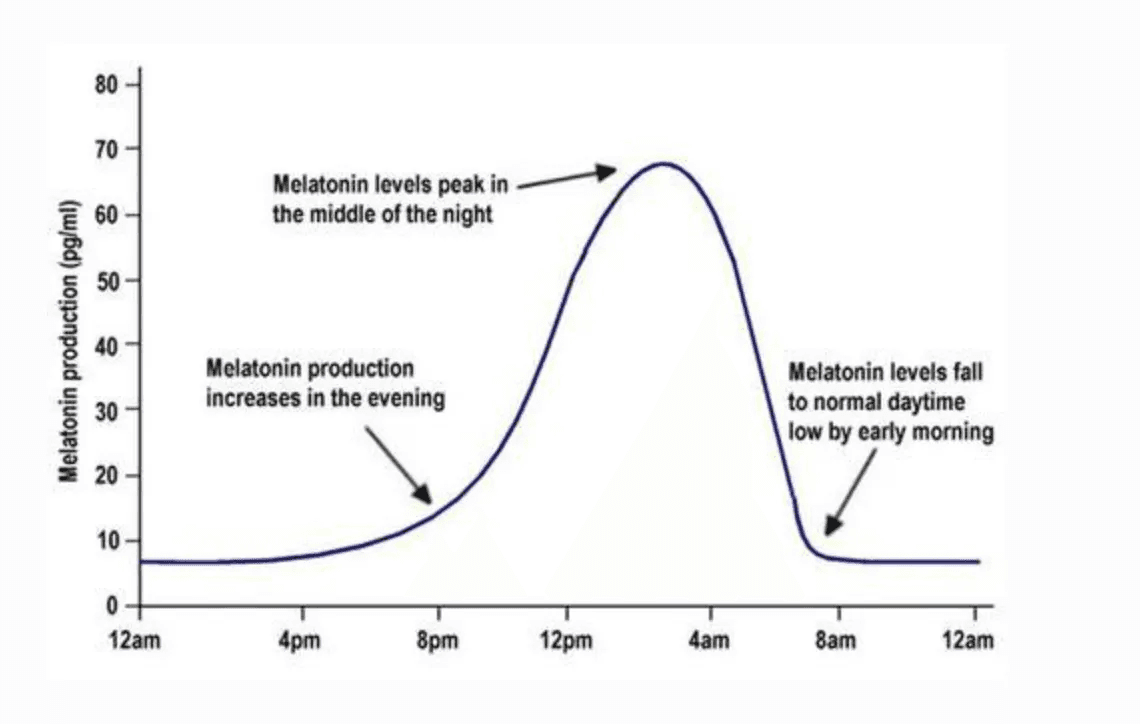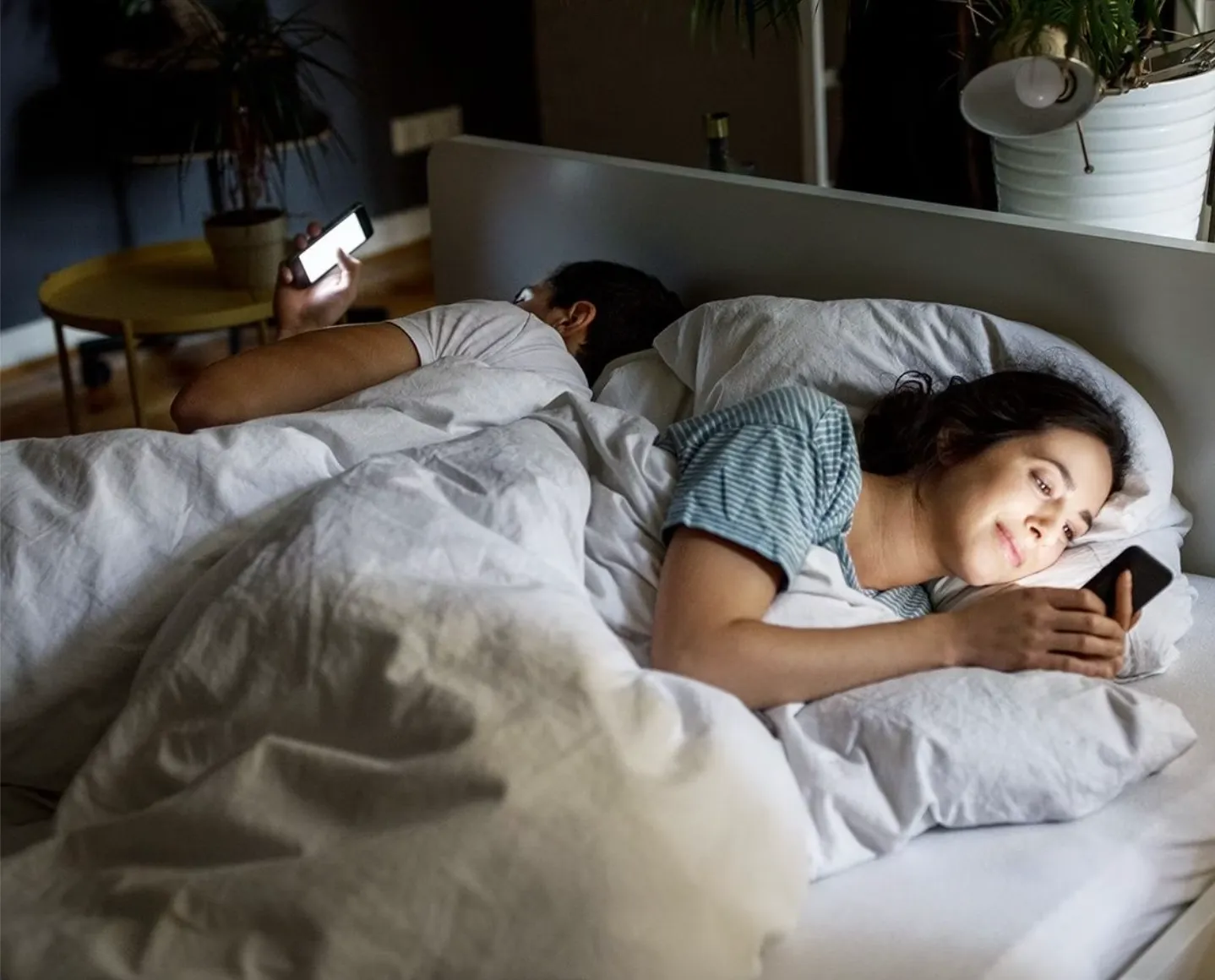Is Your Phone Far Away From Your Bed?
I know, it’s one of the first things people tell you when talking about improving your relationship with screens. “You shouldn’t look at screens right before sleeping.” I plead guilty.
Understand
6 janv. 2025
7 min



Whether it’s an episode on Netflix, a last scroll on LinkedIn, or an email, I’ve done it countless times, and you probably do it too.
Having done it much less today, I explored this week the reasons why keeping technology out of the bedroom can actually make a difference.
Improving your relationship with screens also means rethinking the design of your environment.
😴 Sleep
You know I like numbers, so here are some:
In 30 years, the French have lost 1 hour and 30 minutes of sleep each night (6 hours and 58 minutes today on weekdays).
50% watch television or videos every day before sleeping. It’s 61% for those under 35.
49% check their phone every night before bed. It’s 77% for those under 35.
Do you think number 1 is linked to numbers 2 and 3? 🫢 …It seems that yes.
For many of us, screens are an integral part of our evening routine.
They are not —of course, the only factor explaining this “sleep deprivation epidemic,” according to the term coined by Dr. Joëlle Adrien, a neurobiologist and research director at INSERM.
They are, however, a catalyst.
The time spent on a screen is elastic (without a precise end, and we lose track of time). As a result, it often extends at the expense of other activities.
In the evening, sleep is in the front line.
So there’s a logical correlation: you bring your computer or phone to bed = you spend more time before sleeping than you would have without it. But beyond the bedtime, it’s the time to fall asleep that will be delayed in most cases.
Research conducted in 2022 shows that:
For every 5 minutes you spend on your smartphone in bed, your sleep is delayed by an average of 4 minutes.
For every 10 minutes of use, it’s an increase of 9 minutes.

Why this delay? Let’s take a closer look at the brain.
Sleep depends on the proper functioning of the biological clock (which generates circadian rhythms).
These rhythms define our phases of wakefulness and sleep over a 24-hour period. The biological clock is synchronized by various signals, the most important of which is light. More specifically, through retinal cells that are sensitive to light levels, called melanopsin cells. The activation of these cells by light signals to the brain that it’s time to be awake.
Daylight, referred to as “white” light, is broken down into different wavelengths corresponding to the colors of the rainbow.
Among them, it’s the “blue” light that specifically activates the melanopsin cells in the retina.

This is what regulates the biological clock by indicating that it’s time to be awake. In the absence of stimulation from blue light, melanopsin cells trigger the secretion of the famous melatonin.
It signals to the brain, once twilight falls, that it’s time to go to sleep because it’s dark. According to Andrew Huberman, “it regulates the timing of our sleep.”
However, as you probably know, the lighting from screens is enriched with blue light. Using them in the evening will therefore disrupt your circadian rhythm by suppressing the secretion of melatonin. It makes the brain believe it should remain alert and awake. Preserving melatonin secretion in the evening is crucial for ensuring a restorative night’s sleep.
Here’s a simple diagram to understand this concept.

Furthermore, this is also why Andrew Huberman recommends seeking natural light as soon as possible in the morning to speed up the suppression of melatonin. This exposure will help you stay awake and focused throughout the day. 🌞
For those who —like me, don’t have too much trouble falling asleep even after spending time on screens, there may not necessarily be a delay after their use. However, it will impact the quality of sleep. Whether it’s:
Scrolling on TikTok or Instagram
Checking emails
Reading anxiety-inducing news (and there’s certainly no shortage of that…)
The mental stimulation that comes from using screens in the evening will make relaxation more difficult and won’t create the conditions for restorative sleep. Dr. Joëlle Adrien discusses this in her study:
“Through a sort of guarding effect, we are constantly alert, we only sleep with one eye, while sleep should be a moment of retreat from the outside world, a total disconnection.”
Blue light will subsequently reduce the time spent in deep sleep and REM sleep, two stages of the sleep cycle that are essential for cognitive functioning.
Keeping yourself free from this before sleep seems like a good way to avoid weakened sleep and fatigue the next day.
Not bringing your phone or computer into your bedroom can be a relevant “rule” to implement to maximize your chances of success.
Whether it’s an episode on Netflix, a last scroll on LinkedIn, or an email, I’ve done it countless times, and you probably do it too.
Having done it much less today, I explored this week the reasons why keeping technology out of the bedroom can actually make a difference.
Improving your relationship with screens also means rethinking the design of your environment.
😴 Sleep
You know I like numbers, so here are some:
In 30 years, the French have lost 1 hour and 30 minutes of sleep each night (6 hours and 58 minutes today on weekdays).
50% watch television or videos every day before sleeping. It’s 61% for those under 35.
49% check their phone every night before bed. It’s 77% for those under 35.
Do you think number 1 is linked to numbers 2 and 3? 🫢 …It seems that yes.
For many of us, screens are an integral part of our evening routine.
They are not —of course, the only factor explaining this “sleep deprivation epidemic,” according to the term coined by Dr. Joëlle Adrien, a neurobiologist and research director at INSERM.
They are, however, a catalyst.
The time spent on a screen is elastic (without a precise end, and we lose track of time). As a result, it often extends at the expense of other activities.
In the evening, sleep is in the front line.
So there’s a logical correlation: you bring your computer or phone to bed = you spend more time before sleeping than you would have without it. But beyond the bedtime, it’s the time to fall asleep that will be delayed in most cases.
Research conducted in 2022 shows that:
For every 5 minutes you spend on your smartphone in bed, your sleep is delayed by an average of 4 minutes.
For every 10 minutes of use, it’s an increase of 9 minutes.

Why this delay? Let’s take a closer look at the brain.
Sleep depends on the proper functioning of the biological clock (which generates circadian rhythms).
These rhythms define our phases of wakefulness and sleep over a 24-hour period. The biological clock is synchronized by various signals, the most important of which is light. More specifically, through retinal cells that are sensitive to light levels, called melanopsin cells. The activation of these cells by light signals to the brain that it’s time to be awake.
Daylight, referred to as “white” light, is broken down into different wavelengths corresponding to the colors of the rainbow.
Among them, it’s the “blue” light that specifically activates the melanopsin cells in the retina.

This is what regulates the biological clock by indicating that it’s time to be awake. In the absence of stimulation from blue light, melanopsin cells trigger the secretion of the famous melatonin.
It signals to the brain, once twilight falls, that it’s time to go to sleep because it’s dark. According to Andrew Huberman, “it regulates the timing of our sleep.”
However, as you probably know, the lighting from screens is enriched with blue light. Using them in the evening will therefore disrupt your circadian rhythm by suppressing the secretion of melatonin. It makes the brain believe it should remain alert and awake. Preserving melatonin secretion in the evening is crucial for ensuring a restorative night’s sleep.
Here’s a simple diagram to understand this concept.

Furthermore, this is also why Andrew Huberman recommends seeking natural light as soon as possible in the morning to speed up the suppression of melatonin. This exposure will help you stay awake and focused throughout the day. 🌞
For those who —like me, don’t have too much trouble falling asleep even after spending time on screens, there may not necessarily be a delay after their use. However, it will impact the quality of sleep. Whether it’s:
Scrolling on TikTok or Instagram
Checking emails
Reading anxiety-inducing news (and there’s certainly no shortage of that…)
The mental stimulation that comes from using screens in the evening will make relaxation more difficult and won’t create the conditions for restorative sleep. Dr. Joëlle Adrien discusses this in her study:
“Through a sort of guarding effect, we are constantly alert, we only sleep with one eye, while sleep should be a moment of retreat from the outside world, a total disconnection.”
Blue light will subsequently reduce the time spent in deep sleep and REM sleep, two stages of the sleep cycle that are essential for cognitive functioning.
Keeping yourself free from this before sleep seems like a good way to avoid weakened sleep and fatigue the next day.
Not bringing your phone or computer into your bedroom can be a relevant “rule” to implement to maximize your chances of success.
Whether it’s an episode on Netflix, a last scroll on LinkedIn, or an email, I’ve done it countless times, and you probably do it too.
Having done it much less today, I explored this week the reasons why keeping technology out of the bedroom can actually make a difference.
Improving your relationship with screens also means rethinking the design of your environment.
😴 Sleep
You know I like numbers, so here are some:
In 30 years, the French have lost 1 hour and 30 minutes of sleep each night (6 hours and 58 minutes today on weekdays).
50% watch television or videos every day before sleeping. It’s 61% for those under 35.
49% check their phone every night before bed. It’s 77% for those under 35.
Do you think number 1 is linked to numbers 2 and 3? 🫢 …It seems that yes.
For many of us, screens are an integral part of our evening routine.
They are not —of course, the only factor explaining this “sleep deprivation epidemic,” according to the term coined by Dr. Joëlle Adrien, a neurobiologist and research director at INSERM.
They are, however, a catalyst.
The time spent on a screen is elastic (without a precise end, and we lose track of time). As a result, it often extends at the expense of other activities.
In the evening, sleep is in the front line.
So there’s a logical correlation: you bring your computer or phone to bed = you spend more time before sleeping than you would have without it. But beyond the bedtime, it’s the time to fall asleep that will be delayed in most cases.
Research conducted in 2022 shows that:
For every 5 minutes you spend on your smartphone in bed, your sleep is delayed by an average of 4 minutes.
For every 10 minutes of use, it’s an increase of 9 minutes.

Why this delay? Let’s take a closer look at the brain.
Sleep depends on the proper functioning of the biological clock (which generates circadian rhythms).
These rhythms define our phases of wakefulness and sleep over a 24-hour period. The biological clock is synchronized by various signals, the most important of which is light. More specifically, through retinal cells that are sensitive to light levels, called melanopsin cells. The activation of these cells by light signals to the brain that it’s time to be awake.
Daylight, referred to as “white” light, is broken down into different wavelengths corresponding to the colors of the rainbow.
Among them, it’s the “blue” light that specifically activates the melanopsin cells in the retina.

This is what regulates the biological clock by indicating that it’s time to be awake. In the absence of stimulation from blue light, melanopsin cells trigger the secretion of the famous melatonin.
It signals to the brain, once twilight falls, that it’s time to go to sleep because it’s dark. According to Andrew Huberman, “it regulates the timing of our sleep.”
However, as you probably know, the lighting from screens is enriched with blue light. Using them in the evening will therefore disrupt your circadian rhythm by suppressing the secretion of melatonin. It makes the brain believe it should remain alert and awake. Preserving melatonin secretion in the evening is crucial for ensuring a restorative night’s sleep.
Here’s a simple diagram to understand this concept.

Furthermore, this is also why Andrew Huberman recommends seeking natural light as soon as possible in the morning to speed up the suppression of melatonin. This exposure will help you stay awake and focused throughout the day. 🌞
For those who —like me, don’t have too much trouble falling asleep even after spending time on screens, there may not necessarily be a delay after their use. However, it will impact the quality of sleep. Whether it’s:
Scrolling on TikTok or Instagram
Checking emails
Reading anxiety-inducing news (and there’s certainly no shortage of that…)
The mental stimulation that comes from using screens in the evening will make relaxation more difficult and won’t create the conditions for restorative sleep. Dr. Joëlle Adrien discusses this in her study:
“Through a sort of guarding effect, we are constantly alert, we only sleep with one eye, while sleep should be a moment of retreat from the outside world, a total disconnection.”
Blue light will subsequently reduce the time spent in deep sleep and REM sleep, two stages of the sleep cycle that are essential for cognitive functioning.
Keeping yourself free from this before sleep seems like a good way to avoid weakened sleep and fatigue the next day.
Not bringing your phone or computer into your bedroom can be a relevant “rule” to implement to maximize your chances of success.

Votre téléphone, vos règles. Bloquez ce que vous voulez, quand vous voulez.
Pour 30 minutes
Tous les jours
Le week-end
Pendant les heures de travail
De 22h à 8h
Pour 7 jours
Tout le temps

Votre téléphone, vos règles. Bloquez ce que vous voulez, quand vous voulez.
Pour 30 minutes
Tous les jours
Le week-end
Pendant les heures de travail
De 22h à 8h
Pour 7 jours
Tout le temps

Votre téléphone, vos règles. Bloquez ce que vous voulez, quand vous voulez.
Pour 30 minutes
Tous les jours
Le week-end
Pendant les heures de travail
De 22h à 8h
Pour 7 jours
Tout le temps
🌹 Intimacy
Sleep was an obvious consequence of our use of screens in the bedroom. But the prevalence of technology indoors can also have interpersonal consequences, particularly in couples.
According to a study conducted on 2,000 people in the United States, 55% believe they are losing “quality time” with their partner because of their digital habits.
The bedroom is initially designed for two things: sleep and intimate relationships. The arrival of screens has changed the game.

The study reveals that phones don’t just change how we socialize; they greatly influence our interactions with those closest to us.
Focusing on the bedroom, Esther Perel, a recognized expert in human relationships and a psychotherapist, tells us:
“People go to bed with their phones, in every sense of the word.”
Moreover, more than a third of Americans admitted in the study that their sex life was impacted by screens.
In a thesis published in 2019, David Sbarra, a psychology professor at the University of Arizona, examined the effect of “fragmented attention” on relational conflicts.
When you’re distracted, your attention is divided, whereas one of the essential ingredients for building intimacy is attention in the here and now.
This applies to couples but also to friendships.
This reality coincides with the rise of phubbing in recent years. This portmanteau word (phone + snubbing) refers to the act of ignoring physically present people in favor of consulting your phone.
In this specific case, your partner.
You can imagine that this can create tension but also limit moments of deep and important conversations.
It can therefore be useful to establish rules regarding how to use screens when you’re with someone close, whether it’s your partner or family.
This starts with an awareness of the effects of screen use and beginning to talk about it together.
For couples, keeping technology out of the bedroom can be a good way to promote deeper communication and reduce phubbing.
Creating time for intimacy.
More generally, technology transforms the nature of our relationships. Although we are more connected than ever, the risk is that paradoxically, we drift further apart.
🏝️ Making Your Bedroom a Technology-Free Oasis
Establishing a “digital curfew” —which brings back bad memories, is what most sleep specialists recommend.
The ideal goal would be to stop using screens about an hour before going to bed. To facilitate this virtuous routine, what can help is to make the bedroom a true sanctuary free of technology.
I like this word that defines a sacred, inviolable place.
Consider the bedroom as a haven of mental peace, dedicated to relaxation, intimacy, reading, and sleep. In fact, we do call it a bedroom.The two are closely linked, as keeping screens out of the bedroom will allow for a more disconnected morning, which will lead to better mental clarity for the rest of the day.
A productive day is prepared the night before. So how can you gradually move toward this habit?
You can start by establishing one habit at a time. Here are a few ideas to explore:
⏰ Buy a good old-fashioned alarm clock: an alternative to your phone to wake up and help avoid bringing it into your bedroom.
🔕 No Notifications! If for some reason this isn’t possible for you, at least put it in airplane mode to avoid notifications and light signals during the night.
📵 Define a dedicated space for screens at night: personally, they are on my desk, so they are already ready for me the next morning when I start working.
📚 Prepare reading materials for bed in advance: this way, the alternative to digital will be facilitated.
🔒 Set a specific off-time: schedule a session on your phone to block some distracting apps at night. Ding-dong, how should I do that? Well, you can use the Jomo app, available for free on iPhone, iPad and Mac. Set a Recurring Session rule on Jomo, choose your apps, set your sleep and wake-up times, and hit Block (yes, that’s it).

Not changing your relationship with screens is a colossal opportunity cost in terms of time, motivation, and focus. Try, at least, the experience for a few days before saying that it's not working!
🌹 Intimacy
Sleep was an obvious consequence of our use of screens in the bedroom. But the prevalence of technology indoors can also have interpersonal consequences, particularly in couples.
According to a study conducted on 2,000 people in the United States, 55% believe they are losing “quality time” with their partner because of their digital habits.
The bedroom is initially designed for two things: sleep and intimate relationships. The arrival of screens has changed the game.

The study reveals that phones don’t just change how we socialize; they greatly influence our interactions with those closest to us.
Focusing on the bedroom, Esther Perel, a recognized expert in human relationships and a psychotherapist, tells us:
“People go to bed with their phones, in every sense of the word.”
Moreover, more than a third of Americans admitted in the study that their sex life was impacted by screens.
In a thesis published in 2019, David Sbarra, a psychology professor at the University of Arizona, examined the effect of “fragmented attention” on relational conflicts.
When you’re distracted, your attention is divided, whereas one of the essential ingredients for building intimacy is attention in the here and now.
This applies to couples but also to friendships.
This reality coincides with the rise of phubbing in recent years. This portmanteau word (phone + snubbing) refers to the act of ignoring physically present people in favor of consulting your phone.
In this specific case, your partner.
You can imagine that this can create tension but also limit moments of deep and important conversations.
It can therefore be useful to establish rules regarding how to use screens when you’re with someone close, whether it’s your partner or family.
This starts with an awareness of the effects of screen use and beginning to talk about it together.
For couples, keeping technology out of the bedroom can be a good way to promote deeper communication and reduce phubbing.
Creating time for intimacy.
More generally, technology transforms the nature of our relationships. Although we are more connected than ever, the risk is that paradoxically, we drift further apart.
🏝️ Making Your Bedroom a Technology-Free Oasis
Establishing a “digital curfew” —which brings back bad memories, is what most sleep specialists recommend.
The ideal goal would be to stop using screens about an hour before going to bed. To facilitate this virtuous routine, what can help is to make the bedroom a true sanctuary free of technology.
I like this word that defines a sacred, inviolable place.
Consider the bedroom as a haven of mental peace, dedicated to relaxation, intimacy, reading, and sleep. In fact, we do call it a bedroom.The two are closely linked, as keeping screens out of the bedroom will allow for a more disconnected morning, which will lead to better mental clarity for the rest of the day.
A productive day is prepared the night before. So how can you gradually move toward this habit?
You can start by establishing one habit at a time. Here are a few ideas to explore:
⏰ Buy a good old-fashioned alarm clock: an alternative to your phone to wake up and help avoid bringing it into your bedroom.
🔕 No Notifications! If for some reason this isn’t possible for you, at least put it in airplane mode to avoid notifications and light signals during the night.
📵 Define a dedicated space for screens at night: personally, they are on my desk, so they are already ready for me the next morning when I start working.
📚 Prepare reading materials for bed in advance: this way, the alternative to digital will be facilitated.
🔒 Set a specific off-time: schedule a session on your phone to block some distracting apps at night. Ding-dong, how should I do that? Well, you can use the Jomo app, available for free on iPhone, iPad and Mac. Set a Recurring Session rule on Jomo, choose your apps, set your sleep and wake-up times, and hit Block (yes, that’s it).

Not changing your relationship with screens is a colossal opportunity cost in terms of time, motivation, and focus. Try, at least, the experience for a few days before saying that it's not working!
🌹 Intimacy
Sleep was an obvious consequence of our use of screens in the bedroom. But the prevalence of technology indoors can also have interpersonal consequences, particularly in couples.
According to a study conducted on 2,000 people in the United States, 55% believe they are losing “quality time” with their partner because of their digital habits.
The bedroom is initially designed for two things: sleep and intimate relationships. The arrival of screens has changed the game.

The study reveals that phones don’t just change how we socialize; they greatly influence our interactions with those closest to us.
Focusing on the bedroom, Esther Perel, a recognized expert in human relationships and a psychotherapist, tells us:
“People go to bed with their phones, in every sense of the word.”
Moreover, more than a third of Americans admitted in the study that their sex life was impacted by screens.
In a thesis published in 2019, David Sbarra, a psychology professor at the University of Arizona, examined the effect of “fragmented attention” on relational conflicts.
When you’re distracted, your attention is divided, whereas one of the essential ingredients for building intimacy is attention in the here and now.
This applies to couples but also to friendships.
This reality coincides with the rise of phubbing in recent years. This portmanteau word (phone + snubbing) refers to the act of ignoring physically present people in favor of consulting your phone.
In this specific case, your partner.
You can imagine that this can create tension but also limit moments of deep and important conversations.
It can therefore be useful to establish rules regarding how to use screens when you’re with someone close, whether it’s your partner or family.
This starts with an awareness of the effects of screen use and beginning to talk about it together.
For couples, keeping technology out of the bedroom can be a good way to promote deeper communication and reduce phubbing.
Creating time for intimacy.
More generally, technology transforms the nature of our relationships. Although we are more connected than ever, the risk is that paradoxically, we drift further apart.
🏝️ Making Your Bedroom a Technology-Free Oasis
Establishing a “digital curfew” —which brings back bad memories, is what most sleep specialists recommend.
The ideal goal would be to stop using screens about an hour before going to bed. To facilitate this virtuous routine, what can help is to make the bedroom a true sanctuary free of technology.
I like this word that defines a sacred, inviolable place.
Consider the bedroom as a haven of mental peace, dedicated to relaxation, intimacy, reading, and sleep. In fact, we do call it a bedroom.The two are closely linked, as keeping screens out of the bedroom will allow for a more disconnected morning, which will lead to better mental clarity for the rest of the day.
A productive day is prepared the night before. So how can you gradually move toward this habit?
You can start by establishing one habit at a time. Here are a few ideas to explore:
⏰ Buy a good old-fashioned alarm clock: an alternative to your phone to wake up and help avoid bringing it into your bedroom.
🔕 No Notifications! If for some reason this isn’t possible for you, at least put it in airplane mode to avoid notifications and light signals during the night.
📵 Define a dedicated space for screens at night: personally, they are on my desk, so they are already ready for me the next morning when I start working.
📚 Prepare reading materials for bed in advance: this way, the alternative to digital will be facilitated.
🔒 Set a specific off-time: schedule a session on your phone to block some distracting apps at night. Ding-dong, how should I do that? Well, you can use the Jomo app, available for free on iPhone, iPad and Mac. Set a Recurring Session rule on Jomo, choose your apps, set your sleep and wake-up times, and hit Block (yes, that’s it).

Not changing your relationship with screens is a colossal opportunity cost in terms of time, motivation, and focus. Try, at least, the experience for a few days before saying that it's not working!
© Credits
This article is a revised version of Edition #9 of the Screenbreak newsletter created by Julien Rousset. With his permission, we're sharing this high-quality content with you today! So many thanks to Julien. 😌
Photographies by Unsplash, ScreenBreak and the Internet.
[1] Sondage - Étude pour la journée du sommeil, ifop, 2022.
[2] Adrien - Sommeil : de nouvelles découvertes sur l’exposition à la lumière permettent de comprendre comment dormir mieux, Atlantico, 2018.
[3] Suni, Singh - Technology in the Bedroom, Sleep Foundation, 2024.
[4] Santé : comment le sommeil des Français s'est dégradé, France Télévisions, 2023.
[5] Ellahi, Javed, Begum, Mushtaq, Rehman, Rehman - Bedtime Smart Phone Usage and Its Effects on Work-Related Behaviour at Workplace, 2021.
[6] Kahn, Wu - Should You Avoid Screens Before Bed? A Sleep Doctor’s Take, Rise, 2023.
Continue reading
Continue reading
The Joy Of Missing Out

Développé en Europe
Tous droits réservés à Jomo SAS, 2025
The Joy Of Missing Out

Développé en Europe
Tous droits réservés à Jomo SAS, 2025
The Joy Of Missing Out

Développé en Europe
Tous droits réservés à Jomo SAS, 2025


